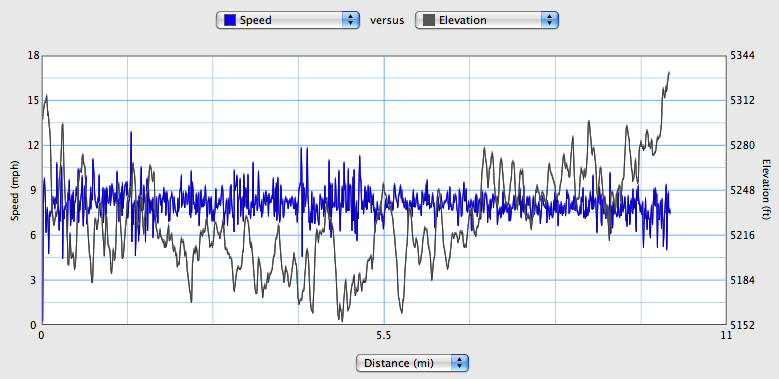Day 3 of Uber Conf 2010 (Day 2 and 1), again, started with a great run with fellow attendees – 10 miles in 1:15:22 with an average pace of 7:28 minutes/mile. Here is the speed-vs-elevation chart:

And complete details about the run are available below:
After a mentally and physically exhausting day, lets see how many runners show up for the run tomorrow morning. I’ll try to be outside the lobby by around 6:30 am-ish.
Attended a 3 hour Scala for Java Programmers Workshop by Venkat and extensive notes + code samples on that are available here.
The next interesting talk I attended was on Emergent Design by Neal Ford and here are the key points:
- Emergent Design is about finding idiomatic patterns (technical and domain) in your code that already exists
- Architecture is stuff that’s hard to change later – e.g. Language, Web framework. You write code on top of that framework and is the Design element which can be easily changed.
- What is software design ? More details on developerdotstar.com/mag/articles/reeves_design.html
- There are known unknowns and there are unknown unknowns – just like software.
- Things that obscure emergent design: nature of complexity (essential and accidental),technical debt,rampant genericness
- Emergent design enablers – TDD, Refactoring to remove technical debt, harvesting/cultivating idiomatic patterns
- Use testing as a design tool, design will emerge from tests, will have better abstractions and less complexity
- Reduce your Technical Debt by writing simpler code
I attended part of the Hudson Workshop and caught some part of Pragmatic Architecture Workshop.
Ted mentioned in his talk about three categories of knowledge:
- Things you know
- Things you know you don’t know
- Things you don’t know what you don’t know
The goal is to move maximum amount of things from Category #3 to #2 and then from #2 to #1.
Attended another talk on How to Approach Refactoring by Venkat and here are the key points captured:
- "Refactoring: genuine desire to improve the quality of your code and design in it" and it keeps you agile
- Write a little code, make it better, write a little code, make it better, … – evolutionary or emergent design leading to agile
- Hardest part in refactoring & unit testing: slow down and take small steps
- Commenting the code during refactoring is like leaving a dead rat on the table, that’s what SCM is for
- We fear to fail, the more we fail in small steps the more we succeed in bigger steps – go refactor your code and make it agile
- Simplicity, Clarity, Brevity, Humanity – best principles to design and refactor code
- Integrate more often and its less time consuming; Integrate less often and its more time consuming
- Principles
- Check in before you start refactoring
- Rely on automated tests
- Reduce, not add, code when refactoring
- Follow the KISS (Keep It Simple Stupid)
- Keep it DRY
- Make code self documented, let the test be the documentation
- Write readable code
- Check in frequently, take small steps
- Keep code at one level of abstraction
The evening concluded with a nice party and a wonderful magic show by Michael Carducci. Enjoy a short video of Jay "trying" to perform a magic trick:
Here are some pictures captured from earlier today:
And then the evolving album:
Technorati: conf uberconf denver refactoring design software architecture